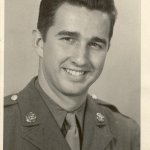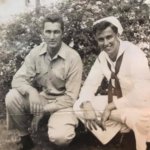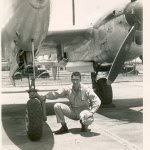Recently, I heard famous social media magnate and business speaker Gary Vaynerchuck talk about how he would be remembered. He said, “The reality is, I’m driven by legacy. Every decision I make is predicated on the long term. It’s not about what’s in my bank account, it’s about how many people will attend my funeral.”
On June 6, 1992, my grandfather, William Emmons — Bill to everyone who knew him — passed away. If I’ve ever known a man who lived a life that left a legacy, it was he. If there’s a man to whom I owe my passion for the Catholic Faith, it’s also he. His was a home filled with sacred imagery, the place where I learned to pray the rosary from one of the many sets of beads hanging from finishing nails along the fireplace mantle. He is the reason I grew up surrounded by men and women of faith — not just my parents, but my aunts and uncles, and later my many cousins. He is the reason why the Catholic religion is woven into every formative moment of my existence. As I look at my own children, I wonder how I can inspire the same in them.

I was 14 years old when he died, the summer after 8th grade. I was at home. My mother had gone to be with him in his final moments, and after he was gone, she made her way back to pick me up. He was the first family member of mine whose death I was old enough to process, and to be honest, I didn’t know what to feel. I struggled with it that whole summer. As a typical ’90s teen, as I was waiting for my mom, I listened to a bootleg copy of Nirvana’s Nevermind — an album I never actually liked — on a Maxell cassette tape. While I was waiting, I remember that I flipped it over so I could record some thoughts about his death on the B-side. I wish I could find that tape now. I wonder what it was that I said.
I had just visited him a couple of days before. He was in home hospice care, lying in a hospital bed where the dining room table had been during all those Christmases we had spent in his house over the years with our many cousins. He’d lived with diabetes and failing vision for years and had suffered several strokes, the most recent and severe of which had completely paralyzed his right side. When it was my turn to sit by his bedside, I did what I always do in uncomfortable situations: I made jokes. I held his hand nervously, and attempted to do an impression of his doctor, who I had been told was from India and had a heavy accent. He couldn’t speak, but a smile creased the left corner of his mouth as I carried on with my impersonation of a man I’d never met, and his hand made a wide arc from where it lay beside him up and over as he touched the tip of his nose. I didn’t know what it meant.
“On the nose,” my aunt said with a big smile. “He’s saying you got it on the nose.”
It was, to my mind, a huge gesture for a man suffering so, who could barely communicate. It made me so happy that he had made such an effort to let me know he thought it was funny. I didn’t know it at the time, but that moment would be the last time I ever saw him alive.
The older I get, the more I wish I’d known him better. I spent eight years of my childhood in Connecticut, my family making the five-hour drive to Binghamton, New York — where my grandparents lived — only once or twice a year. Later, when we moved back to New York, age and infirmity had already taken a toll on his mental state and mood. Pressure on a nerve caused by a swollen blood vessel in his brain sometimes caused him to hallucinate. He had a tendency, at that point, to be a bit grumpy — to be irritable about the kind of noise children always make, or to misunderstand things we were doing because he could no longer see clearly. Once, when I was about 10, he saw me watching a news feed of a NASA satellite and admonished me not to watch that kind of programming. I didn’t know what he thought I was watching, but I thought he was crazy and mean. I had no idea what his problem was, because I saw him with the mind of a child. As children do, I wasted so many opportunities to talk with him and learn from him, choosing instead to avoid him, thinking it was the best way to steer clear of unnecessary trouble. And because of that choice, I missed out on a lot — something I began to realize only when the time came for his funeral.
Simplicity in Greatness

Bill Emmons was born on September 17, 1920, the son of U.S. attorney Ralph Emmons and his wife Ellen. He served as as a sergeant in the U.S. Army Air Corps during World War II. As I recall the story, he had wanted to be a pilot, but a concussion he suffered as a child after being hit by a car led to problems with his vision that kept him grounded. Instead, he worked as a mechanic, taking care of the vehicles on base. I don’t know if this is where he fell in love with working on engines or if he was naturally suited to the task, but I never saw him do any other kind of work as long as I knew him.
He had a love affair with the automobile that was surpassed only by his love for his family and his faith. He always had a car or two at his house that he was in the process of fixing up so he could sell. Later in life, when his vision had all but completely failed him and he could no longer drive, he could sit and listen to the engines of passing cars, and more often than not, he could tell you the make and model.

In fact, he met my grandmother in large part because of a car. It was just after the war, and he was working at a gas station in West Virginia. She drove up one day in a Ford Model T — already a classic at the time — and both were hard not to notice.
“Well, will you look at that!” he exclaimed.
“The car? Or the girl?” his co-worker asked.
“You can keep the car. I’m talking about the girl,” he responded. For him to overlook that particular car was a big deal, and I can just see the grin on his face in my mind.
It wasn’t long before the two of them were an item. My grandmother was a Methodist, however, and my grandfather a devout Catholic. There came a point where he knew he had to lay it on the line.
“Nina,” he told her. “This is getting serious between us. But we’re not going to be able to keep seeing each other unless you’re willing to talk to a priest about coming into the Church.”
As it turned out, she was. She had already been soul-searching, feeling that there was something more out there that she needed to discover about God. I’m awfully glad she felt that way, or I doubt I’d be here writing about anything at all. He was a man of his word.

It was only in his final year, as I started to grow ever so slightly in maturity, that I began to realize I was losing a man from whom I could learn so much. To my shame, I will never forget a time when, as a frustrated teen, I had gotten a bit too high and mighty. I was having an argument with my parents about the dignity of certain kinds of work. I acted as though I was above working in a gas station as he once did, doing the honest sort of work I had decided was embarrassingly menial.
What I failed to see was that it’s not the work you do, but how you do it that defines you. My grandfather was a man full of a selflessness and integrity that I couldn’t grasp. He loved the work he did, and he did it well. He also loved the family he did it for. He was the kind of man who would stop to help any stranded motorist he saw, day or night, rain or shine. And although he could be strict, he was also full of joy, ready with a joke or a story or a laugh. He was rarely able to talk about his faith or the people he loved without being moved to tears — a trait I inherited. He saw the good in people, and he never thought twice about going out of his way to come to the aid of a stranger in need. He married an amazing woman, raised eight children, had 34 grandchildren, and now has more great-grandchildren than I can count.

And the vast majority of them are practicing Catholics to this day. How’s that for a legacy?
The thing that really grabbed my attention — and has stuck with me ever since — happened in the days leading up to his funeral. That June in 1992, when God finally called him home, I stood with my mother and father and aunts and uncles at my grandfather’s wake. Never before and never since have I seen lines of people coming to pay their respects like that. He was a man who held no public office; had no claim to fame; and seemed, from the outside, to have lived the sort of everyday working man’s life that might very well have gone unnoticed. And yet here people were, standing in line to see him one last time because of the impact he had made on their lives. My eyes were opened that day, and it’s something I’ve thought about often since:
“Who will come to my funeral? If they come, will they be there out of a sense of obligation or out of love? Will there be so many whose lives I made better as he did?”
If I’m being honest, I don’t like the answers I have for these questions. I have such a long way to go. As I embark on the fifth decade of my life, I now see the terrible deception that proud, stubborn, teenaged version of myself was under: it’s not the work you do that people will remember; it’s the man you are. And at this point in my life, I’d give anything to be half the man he was. I’ve spent a long time trying to learn lessons I bet he could have just taught me if I’d had the sense back then to ask him. To sit down and just listen. And I’m still not even close to done yet. Maybe that’s why, for years after he died, I had dreams that he would come home, as if he’d merely gone on vacation for a while. And for those moments, until I’d wake up, there was a sense that something broken had been made whole.
Life has never felt quite right without him.
On this anniversary of his death, I ask our readers to please say a prayer for the repose of his soul, and that of his beloved wife, my grandmother. I miss them both very much.
Requiem Aeternam dona eis, Domine
R. et lux perpetua luceat eis:
Requiescant in pace.
R. Amen.
A version of this article first appeared at SteveSkojec.com.






